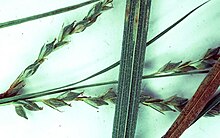| Carex roanensis | |
|---|---|

| |
|
Scientific classification
| |
| Kingdom: | Plantae |
| Clade: | Tracheophytes |
| Clade: | Angiosperms |
| Clade: | Monocots |
| Clade: | Commelinids |
| Order: | Poales |
| Family: | Cyperaceae |
| Genus: | Carex |
| Subgenus: | Carex subg. Carex |
| Section: | Carex sect. Hymenochlaenae |
| Species: | C. roanensis
|
| Binomial name | |
| Carex roanensis | |
Carex roanensis is a species of sedge known by the common name Roan Mountain sedge. It is native to North America, where it can be found in the southern Appalachian Mountains. [1] It was first collected on Roan Mountain in Tennessee in 1936. [2] It was not collected again for fifty years. [3] Now it is known from Georgia, Kentucky, North Carolina, Pennsylvania, South Carolina, Tennessee, Virginia, and West Virginia. [1]
This plant forms small clumps of stems up to 85 centimeters tall. The stem bases and leaf sheaths are tinged maroon. The leaf blades are hairy. The inflorescence contains a terminal spike and two to three lateral spikes. There has been some question as to whether this plant is a true species, or perhaps a hybrid. [3] [4] Genetic analysis confirms that it is a species in its own right. [5]
This plant grows in forests at moderate or higher elevations, sometimes in wooded areas but more often in the open. [1] It is associated with beech and birch species. [3] It may grow alongside the similar Carex species C. aestivalis and C. virescens. [1]
References
- ^ a b c d Carex roanensis.[ permanent dead link] The Nature Conservancy.
- ^ Churchill, J. A. and K. Wurdack. (1986). Carex roanensis rediscovered. Castanea 51(2) 149-51.
- ^ a b c Carex roanensis. Archived October 26, 2011, at the Wayback Machine Center for Plant Conservation.
- ^ Carex roanensis. Flora of North America.
- ^ Smith, T. W. and M. J. Waterway. (2008). Evaluating the taxonomic status of the globally rare Carex roanensis and allied species using morphology and amplified fragment length polymorphisms. Systematic Botany 33(3):525-535.
External links
Further reading
- Smith, T. W., et al. (2006). The geographic and ecological distribution of the Roan Mountain Sedge, Carex roanensis (Cyperaceae). Castanea 71(1) 45-53.
| Carex roanensis | |
|---|---|

| |
|
Scientific classification
| |
| Kingdom: | Plantae |
| Clade: | Tracheophytes |
| Clade: | Angiosperms |
| Clade: | Monocots |
| Clade: | Commelinids |
| Order: | Poales |
| Family: | Cyperaceae |
| Genus: | Carex |
| Subgenus: | Carex subg. Carex |
| Section: | Carex sect. Hymenochlaenae |
| Species: | C. roanensis
|
| Binomial name | |
| Carex roanensis | |
Carex roanensis is a species of sedge known by the common name Roan Mountain sedge. It is native to North America, where it can be found in the southern Appalachian Mountains. [1] It was first collected on Roan Mountain in Tennessee in 1936. [2] It was not collected again for fifty years. [3] Now it is known from Georgia, Kentucky, North Carolina, Pennsylvania, South Carolina, Tennessee, Virginia, and West Virginia. [1]
This plant forms small clumps of stems up to 85 centimeters tall. The stem bases and leaf sheaths are tinged maroon. The leaf blades are hairy. The inflorescence contains a terminal spike and two to three lateral spikes. There has been some question as to whether this plant is a true species, or perhaps a hybrid. [3] [4] Genetic analysis confirms that it is a species in its own right. [5]
This plant grows in forests at moderate or higher elevations, sometimes in wooded areas but more often in the open. [1] It is associated with beech and birch species. [3] It may grow alongside the similar Carex species C. aestivalis and C. virescens. [1]
References
- ^ a b c d Carex roanensis.[ permanent dead link] The Nature Conservancy.
- ^ Churchill, J. A. and K. Wurdack. (1986). Carex roanensis rediscovered. Castanea 51(2) 149-51.
- ^ a b c Carex roanensis. Archived October 26, 2011, at the Wayback Machine Center for Plant Conservation.
- ^ Carex roanensis. Flora of North America.
- ^ Smith, T. W. and M. J. Waterway. (2008). Evaluating the taxonomic status of the globally rare Carex roanensis and allied species using morphology and amplified fragment length polymorphisms. Systematic Botany 33(3):525-535.
External links
Further reading
- Smith, T. W., et al. (2006). The geographic and ecological distribution of the Roan Mountain Sedge, Carex roanensis (Cyperaceae). Castanea 71(1) 45-53.
